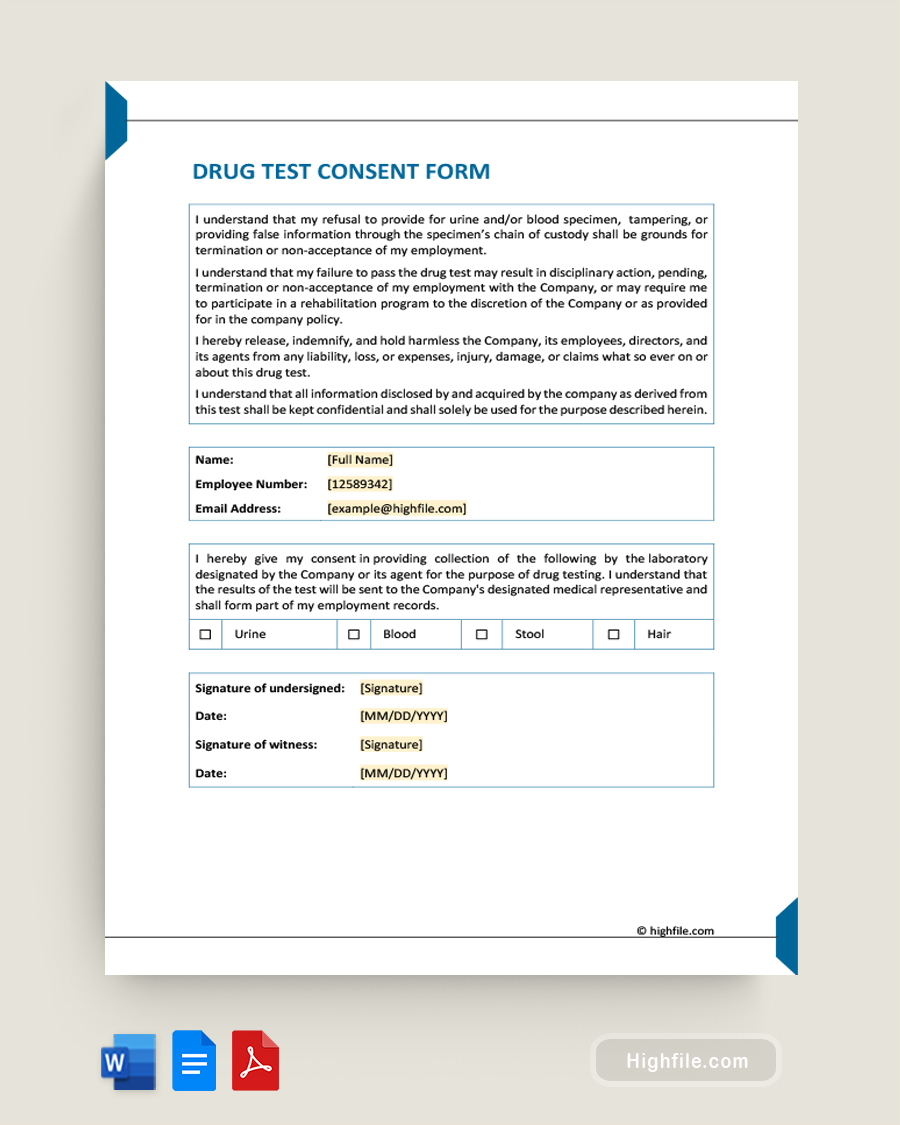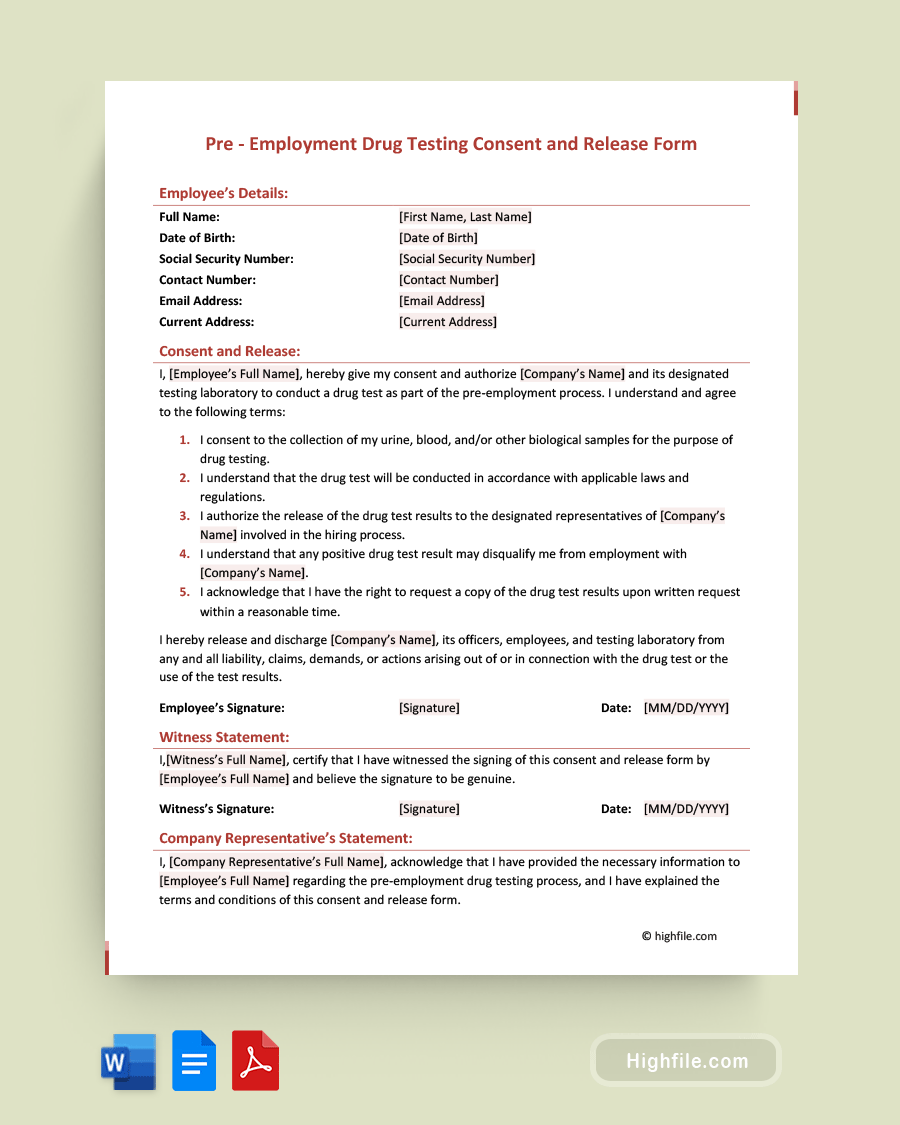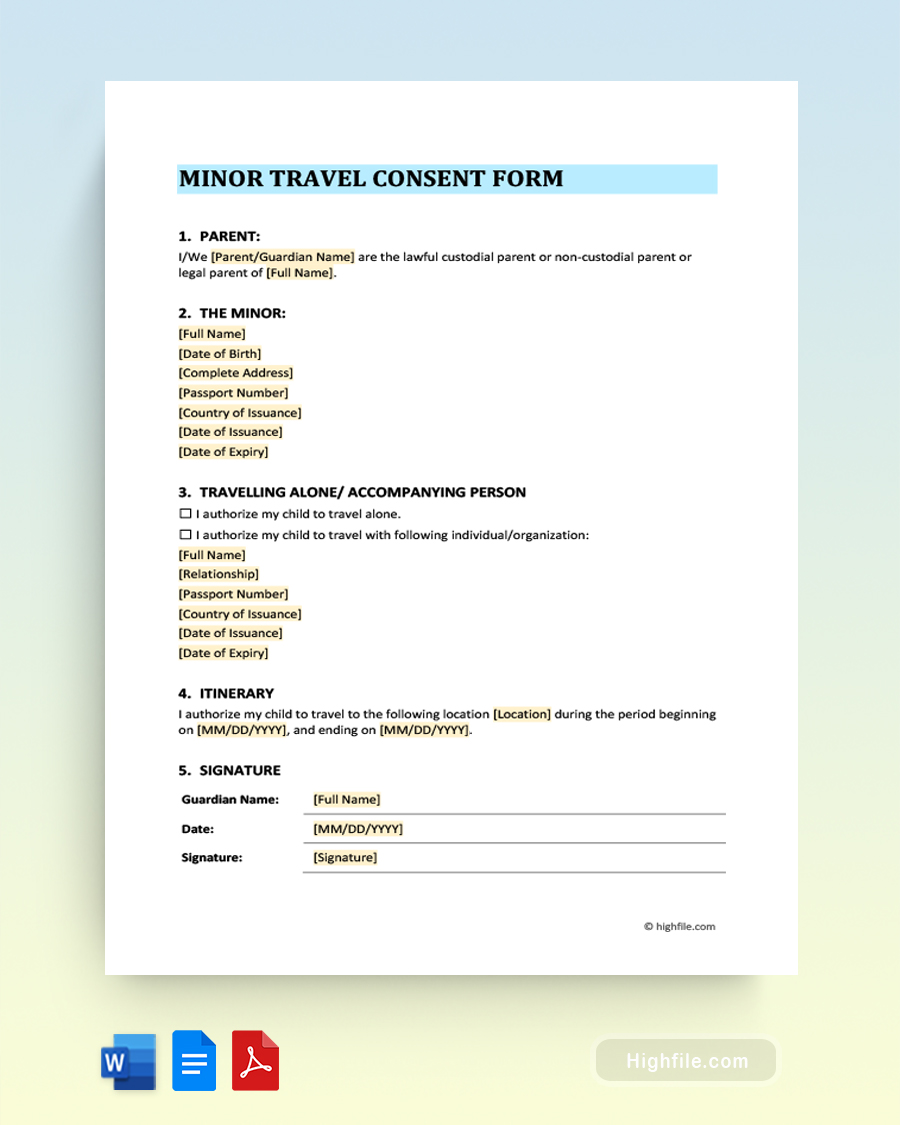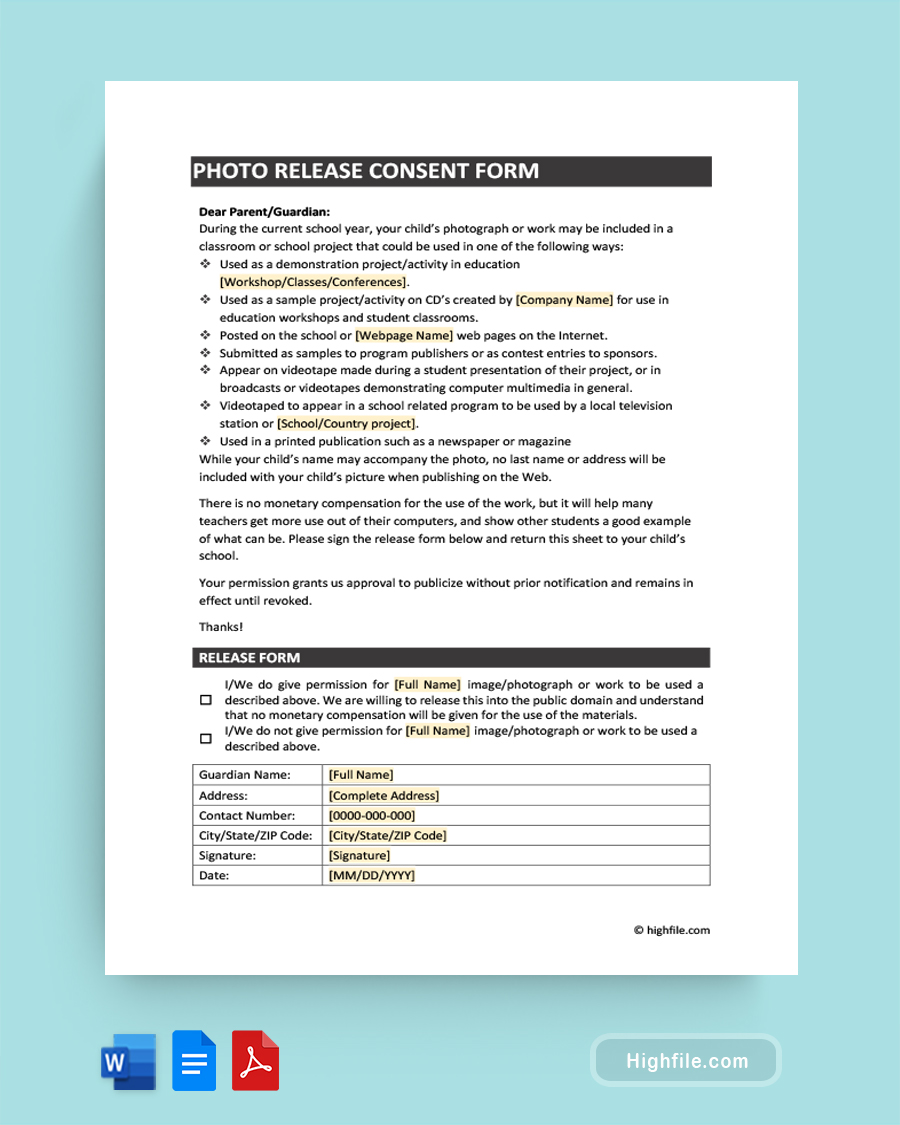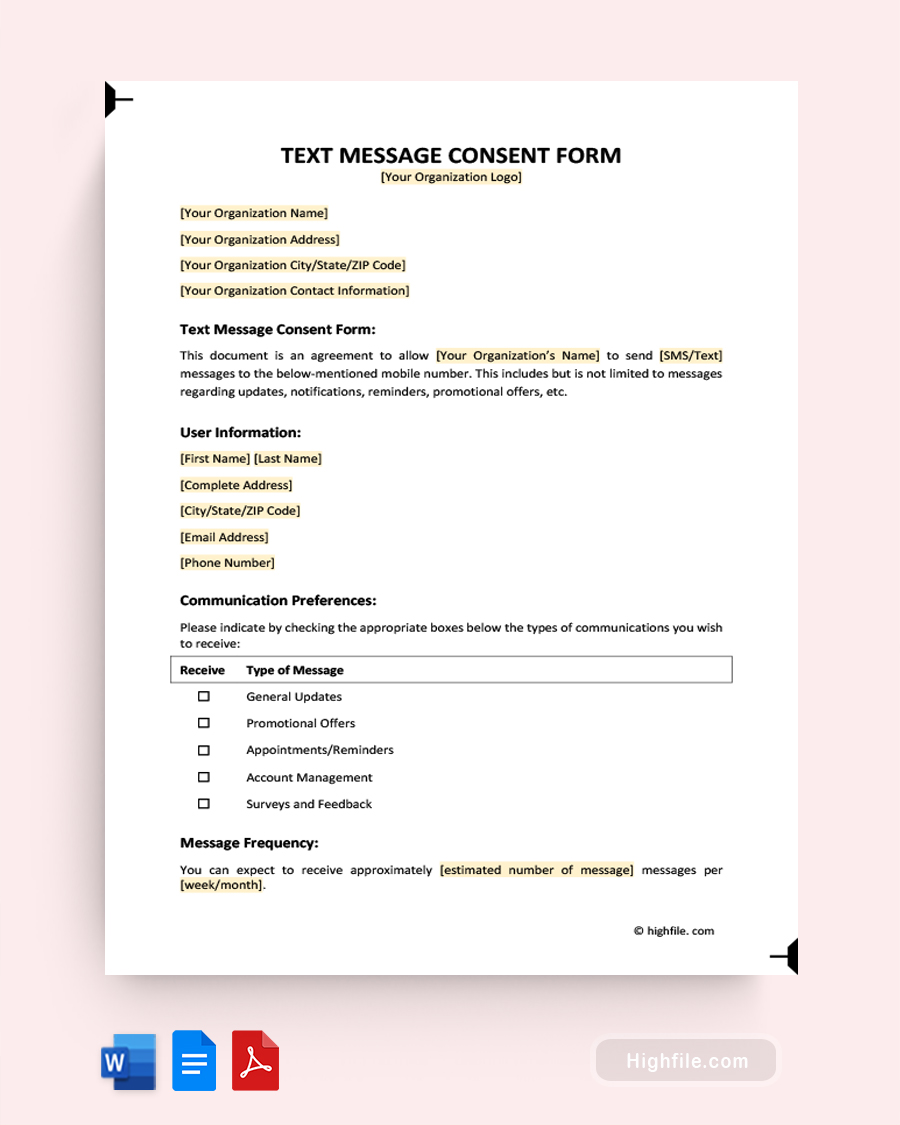Drug testing is an integral part of many organizations’ safety protocols. To ensure that the process is conducted in a legal and ethical manner, it is essential to have a drug test consent form in place. This form serves as a written agreement between the employer and employee that outlines the details of the drug test, including what substances will be tested for, when the test will take place, and how the results will be used. It also ensures that employees know their rights and responsibilities regarding drug testing. A well-crafted drug test consent form template can help employers create an effective, practical document that meets all legal requirements while protecting both parties involved.
What Is a Drug Test Consent Form?
A drug test consent form is a document that outlines the rights and responsibilities of an individual who agrees to take part in a drug test. It is designed to ensure that the individual understands what they are consenting to and that their rights are respected. The form also serves as a record of informed consent, which is essential for any medical procedure or testing. By signing their consent, the subject agrees to submit to the drug test and acknowledges any potential risks. This document can be used by employers, schools, or other organizations when conducting drug tests on individuals.
Essential Elements of a Drug Test Consent Form
The essential elements of a drug test consent form include identifying information for the company or organization, name, contact information, and signatures of the test subject and witness, and general statements of consent. We’ve provided an outline below to indicate precisely what data to collect and where it belongs on the page.
- Company name or logo
- Form title that says “Drug Test Consent Form” in large, bold print at the top
- Statements of assent showing the reader understands what they are being asked, how to do it, benefits, such as an employment offer, and the consequences for refusal
- Name
- (Optional if Relevant) Employee or other ID numbers
- Contact information such as phone number or email
- A checklist for the type of sample collection, such as urine, stool, blood, or hair
- Signature and date
- Witness signature and date
Three Tips for a Better Drug Test Consent Form
Although drug test consent forms are typically very straightforward, there are a few steps you can take to create a better document. Below you’ll find our top three best tips for crafting a better, more professional, and complete consent form.
- Use a professionally designed template to quickly and easily create a custom drug test consent form.
- Provide specific details on where and when the subject/reader should go to complete the test.
- Explain the cost, if any, and the consequences of refusal in clear, concise language.
Common Types of Drugs Tested
Drug tests can detect a wide range of substances, including illicit drugs, prescription medications, and even alcohol. Below is a brief overview of the nine most common drugs employers, sports organizations, hospitals, the police, and other entities are explicitly looking for.
- Steroids, including those that are legally prescribed
- Phencyclidine, commonly known by its street name PCP
- Opiates and opioids, including prescription medication
- THC, including that found in some CBD products
- Marijuana, including recreationally legal and medically prescribed
- Cocaine
- Barbiturates, including most prescription drugs ending in “barbital.”
- Amphetamines, typically methamphetamine
- Alcohol
Random Testing
In the United States, random drug testing can be conducted if certain conditions are met. These include informed consent from the employee and a conditional offer of employment. Prior to requiring random drug testing, it is essential to be aware of the legalities surrounding it. For example, you cannot coerce an applicant into signing, but you can refuse to offer them the job. In short, creating a professional drug test consent form to include in your hiring paperwork and making employment conditional upon acceptance is legal and a smart way to reduce drug-related accidents and the resulting insurance and workman’s compensation claims.
Pre-Employment Drug Testing
Pre-employment drug testing is a common practice among employers to ensure that their employees are not using drugs. Employers need to be aware of the rights of their employees and the legal implications of pre-employment drug testing. Employers should also make sure that they obtain informed consent from potential employees before conducting a background check or pre-employment drug test.
Testing for substance abuse, in particular, can help employers create a safe and productive work environment for all involved, plus it may help reduce insurance costs and liability for accidents. It is a common misconception that paying for drug screening increases costs. While it will cost money, this is generally offset by insurance savings and reduced accidents, as well as less product damage and fewer missed days due to drug-related accidents and injuries. In the long term, it saves most employers far more than it costs. This is especially true for medium to large businesses.
Can Employees be Required to Take a Drug Test
Employers can require drug tests of their employees, but they must do so in a way that respects the rights of their employees. This means that employers must provide informed consent and ensure that the tests are conducted in a fair and unbiased manner. Employees also have rights concerning drug testing, such as refusing consent or challenging test results. However, a failed drug test will likely result in the company not extending an offer of employment unless the employee voluntarily retests, often paying out of pocket. Notably, the right to refuse a drug test does not grant you the right to demand employment without taking one.
Do Employers have to Require a Drug Test
Most employers do not have to require a drug test or a drug-free workplace. However, it is a widespread practice. Not only can it impact insurance rates negatively if not done, but some types of employers are required to test—for example, people in the securities industry and government contractors. For current information on which states have laws requiring employers to do drug tests, you can check out this link (https://www.aclu.org/other/state-state-workplace-drug-testing-laws) to the ACLU state-by-state list of workplace drug testing laws.
Drug Testing Laws
Drug testing laws in the US are designed to protect the rights of individuals while ensuring that employers and other organizations can conduct drug tests when necessary. These laws require informed consent from individuals before they can be tested for drugs, and they also provide guidelines for how drug test consent forms should be completed. Understanding these laws is vital for employers and employees, as it ensures everyone’s rights are respected during the process.
While no federal laws prohibit testing, there are a few states that limit the types of drug testing employers can require. It’s a good idea, and sometimes required by law, to let any existing employees know about a policy change if you didn’t test for drugs previously. Take the time to explain why the policy is changing and their options. Moreover, it’s vital to ensure you are not falsely dismissing employees with legal prescriptions for certain drugs, as this may create a liability issue for wrongful termination.
FAQs
Employers and other organizations planning to begin drug testing often have additional questions about consent and when it applies. We’ve answered the most common questions here to help demystify the issue. You’ll find information on who can drug test, when, and some rare instances when consent is not a legal requirement.
Drug testing without consent is a controversial issue that has been debated for many years. While some argue that it is an invasion of privacy, others believe it is necessary to ensure workplace safety and productivity. Almost everywhere in the US, informed consent is a prerequisite, meaning that the person being tested must be aware of the test and agree to it in writing. Without informed consent, drug testing can be considered illegal in some cases.
The police cannot ask for a drug test without the consent of the person being tested. In order to do so, they must obtain an informed consent form from the individual before administering any tests. Furthermore, even if a drug test is requested without consent, it may still be considered invalid and not admissible in court. Therefore, it is essential for police officers to understand their legal obligations when requesting a drug test and ensure that they have obtained informed consent from the individual prior to conducting any tests.
Drug testing in prisons is a controversial issue. In some cases, inmates can be tested without their consent. This raises questions about the legality of such tests and whether they violate prisoners’ rights. Informed consent is an integral part of any drug test. Without it, prisoners may not be aware that they are being tested or what the results could mean for them. Sometimes, a drug test consent form must be signed before the test can take place. However, there are exceptions to this rule in certain prisons where inmates can be tested without their consent.
In some cases, a doctor or hospital may order a drug test without the patient’s knowledge or consent. This is usually done when there is suspicion of drug use or abuse, and the doctor needs to confirm it. Informed consent forms are not always necessary for drug tests as long as the doctor has reasonable cause to believe that the patient may be using drugs. However, if a doctor orders a drug test without your consent, they must explain why they did so and provide you with an explanation of the results.
Informed consent is required for any drug test conducted in schools, regardless of whether the student or parent has given permission. The school must provide information about the test and its purpose before administering it. Athletes may be subject to additional drug tests when participating in competitive sports, but they can refuse. However, doing so may be seen as an admission of guilt and bar them from participation. Moreover, signing the consent form for drug testing is often included in a packet of other mandatory paperwork when a student signs up for the activity, so the school may not issue an additional, separate consent form if they have this on file, in which case they can test as needed. Always keep a copy for your own records so you know what you’ve signed.
The military has the right to drug test its soldiers without their consent. This is because when soldiers join the military, they waive certain rights, including the right to informed consent for drug testing. While this may seem like an infringement of rights, it is necessary for the safety and security of all soldiers and personnel in the military. The military must be able to ensure that its soldiers are not using drugs or other substances that could impair their performance or put them in danger. Drug testing without consent allows them to do this quickly and efficiently.
Final Thoughts
Drug testing is an important part of many workplaces and organizations. However, to protect people’s rights, you must have consent. This vital document outlines the employee’s rights and informs them of their right to refuse a drug test if they feel uncomfortable with it. It also outlines the consequences of refusing a drug test, such as termination from employment or participation and other disciplinary action. Creating a drug test consent form can help ensure that employees or other participants are not using drugs or alcohol when your business or organization may be liable for their actions. You can save on insurance and reduce accidents and injuries by pre-screening for substance abuse. Best of all, by using a professionally designed drug test consent form template, you will have the framework to ensure you treat people fairly and do not miss any vital information.
